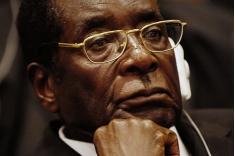The US State Department’s 2009 report on human rights in Zimbabwe paints a grim picture: a broad definition of sodomy carrying a $5,000 fine or up to a year in prison, government censorship and confiscation of any queer materials, lack of treatment for HIV/AIDS for gay men and disturbing reports of “corrective” rape.
“Because of significant social pressure, some families reportedly subjected men and women to ‘corrective’ rape and forced marriages to encourage heterosexual conduct; the crimes were rarely reported to police. Women in particular were subjected to rape by male members of their own families,” the report states.
The Canadian government has already taken a stand against human rights violations in Zimbabwe.
“Canada opposes human rights violations based on sexual orientation and will continue to work for the upholding of human rights for all individuals,” says a spokesperson for the Department of Foreign Affairs and International Trade. “Canada employs bilateral and multilateral channels to speak out against human rights violations and the failure to respect the rule of law. We have recommended that the Government of Zimbabwe take immediate, concrete steps to comply with its UN Treaty (ICCPR) obligations.”
Zimbabwe was expelled from the Commonwealth in 2002 for human rights abuses and election tampering and faces sanctions. Canada maintains an asset freeze and travel restrictions against the country’s ruling ZANU-PF elites in order to send a message about its abhorrence of the human rights violations in the country, while minimizing the impact on the population.
But what else can be done, given that abuses continue in a country that already faces sanctions?
NDP foreign affairs critic Paul Dewar suggests more support for organizations like Rights and Democracy, which has done work in Zimbabwe.
“Right now, it’s not like we’re going to be able to send the foreign affairs minister there and be received there, so you need to be able to work with allies,” Dewar says. “We need to ensure that groups like Rights and Democracy and other human rights agencies are able to do their work on the ground to support people.”
Rights and Democracy is currently under fire with allegations that government-appointed board members have derailed the organization’s mission in order to take a staunch pro-Israel stance.
Dewar also suggests that Canada could make a difference by receiving those affected here.
“That’s the other issue — what are we doing to ensure that those who are being persecuted abroad are able to gain safe passage here?” Dewar asks. “We’d like to see the protections there for those who are having to flee from the kinds of repressive regimes like Zimbabwe’s.”
Liberal foreign affairs critic Bob Rae believes that this latest report demonstrates a need for Canada to make its own human rights reports public.
“The Department of Foreign Affairs does do human rights surveys, but they don’t become public, they’re not public documents,” Rae says. “I think it would be to a great advantage to the world for us to see them. There is a significant problem of very active and in some cases brutal discrimination against gays and lesbians in Zimbabwe among many other countries.
“We need to see a much clearer account by Canada of how gays and lesbians are being treated around the world, and give us a much clearer indication of how those human rights are being abused. I think it’s very important that we get active and see exactly what’s taking place.”


 Why you can trust Xtra
Why you can trust Xtra


